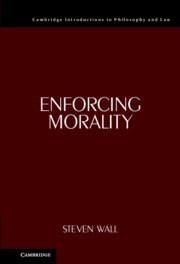Book contents
- Enforcing Morality
- Cambridge Introductions to Philosophy and Law
- Enforcing Morality
- Copyright page
- Contents
- Acknowledgments
- 1 Introduction
- Part I Background Controversies
- Part II Critical Legal Moralism
- 5 Ethical Environmentalism I
- 6 Ethical Environmentalism II
- 7 The Good of Personal Liberty
- 8 Rights to Do Wrongs
- 9 Free Expression
- 10 Pragmatism and the Perils of Enforcement
- Bibliography
- Index
5 - Ethical Environmentalism I
from Part II - Critical Legal Moralism
Published online by Cambridge University Press: 03 November 2023
- Enforcing Morality
- Cambridge Introductions to Philosophy and Law
- Enforcing Morality
- Copyright page
- Contents
- Acknowledgments
- 1 Introduction
- Part I Background Controversies
- Part II Critical Legal Moralism
- 5 Ethical Environmentalism I
- 6 Ethical Environmentalism II
- 7 The Good of Personal Liberty
- 8 Rights to Do Wrongs
- 9 Free Expression
- 10 Pragmatism and the Perils of Enforcement
- Bibliography
- Index
Summary
There is no getting around the fact that we live in a social and cultural environment and there is no denying the fact that the laws of our society deeply affect its character. From the fact that law impacts the environment of those who are subject to it, it does not follow that legal officials should attempt to improve its ethical character. This chapter presents a presumptive case for why legal officials are not only permitted but also have a duty to do so. Ethical environmentalism is the political project that aims to satisfy that duty. After clarifying the notion of an ethical environment, and relating it to the aspirational ideal of the common good of a society, the chapter argues that ethical environmentalism is supported by considerations of fairness. The relation between fair treatment and neutral treatment is then explored and clarified. Ethical environmentalism presupposes a public/private distinction. The shared public world, as contrasted with the private thoughts and activities of individuals, defines its scope. With that in mind, the chapter distinguishes two forms of legal moralism, character-centered and status-centered, and discusses how each form relates to the project of ethical environmentalism.
- Type
- Chapter
- Information
- Enforcing Morality , pp. 89 - 110Publisher: Cambridge University PressPrint publication year: 2023

